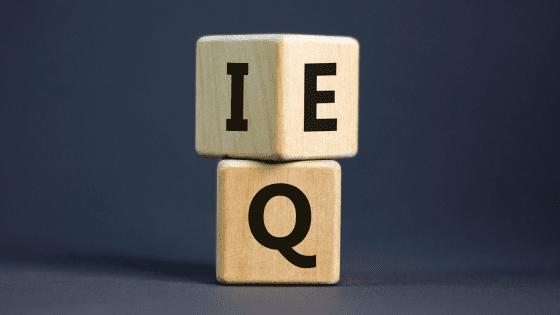Have you ever been part of a team where the leader seemed to read the room like a book, addressing concerns before they turned into conflicts and celebrating successes in a way that made everyone feel genuinely valued? This ability to navigate the human aspect of management is not just a natural talent; it’s a cultivated skill known as emotional intelligence (EI/EQ). But why do some leaders have their fingers on the pulse of their team’s emotional landscape while others seem tone-deaf to morale?
What is Emotional Intelligence in leadership?
Emotional intelligence in leadership refers to a leader’s ability to perceive, understand, and manage their own emotions and those of others. At its core, emotional intelligence is about awareness—of self and others—and the skilled adaptation to the emotional undercurrents that flow through every interaction. It’s the ability to handle stress without passing it on, to inspire and uplift, to communicate effectively, and to build relationships that aren’t just based on professional necessity but genuine rapport.
The Importance of EQ for First-Time and Mid-Level Managers
For first-time and mid-level managers, developing high emotional intelligence is a crucial leadership skill. These managers are often at the coalface of an organisation, dealing directly with the team members who execute the company’s strategic vision. Their role in shaping employee morale and performance is pivotal. When they lead with emotional intelligence, they can better understand and support their people, drive engagement, and foster a positive work culture that echoes through the company. Emotional intelligence isn’t just beneficial; it’s a critical element of effective leadership.
In the subsequent sections, we’ll unveil the transformative power of emotional intelligence in leadership, illustrating how it’s not just a good-to-have, but an essential leadership tool. Let’s embark on this journey to uncover how emotional intelligence can be your compass to leadership success.
The Essence of Emotional Intelligence in Leadership
Historically, a leader’s intelligence quotient (IQ) was viewed as the foremost predictor of success—how well they could analyse problems, understand complex ideas, and process information. Yet, time and research have shown that while IQ shapes a leader’s technical ability and knowledge, emotional intelligence moulds a leader’s ability to relate to others, manage stress, and make decisions in a human-centric workplace.

The Four Components of Emotional Intelligence
- Self-Awareness: This is the cornerstone of emotional intelligence, where leaders recognise their own emotions and understand how they affect their thoughts and behaviour. Self-aware leaders are attuned to their strengths and limitations, and this consciousness helps guide them through the challenges of management. It allows them to approach situations from a place of confidence and humility, which is essential for authentic leadership.
- Self-Management: Here lies the ability to control impulsive feelings and behaviours, to manage emotions in healthy ways, take initiative, follow through on commitments, and adapt to changing circumstances. A self-managed leader is not thrown off course by a storm; they navigate through it with steady hands and a calm demeanour, setting a reassuring example for their team.
- Social Awareness: This component embodies a leader’s knack for empathy, and their ability to understand the emotions, needs, and concerns of others. By picking up on emotional cues, they can grasp what is happening within the team’s dynamic and respond accordingly. Socially aware leaders create an atmosphere of trust and respect, where team members feel heard and understood.
- Relationship Management: Often the culmination of the other elements, this is about a leader’s ability to develop and maintain good relationships, communicate clearly, inspire and influence others, work well in a team, and manage conflict. Think of it as the art of relationship alchemy—turning individual talents into collective success.
In practice, leaders with high emotional intelligence draw upon these four components to enhance their interactions. They create environments where people feel valued and respected, and where the emotional climate fosters productivity and innovation.
Why Emotionally Intelligent Leadership Matters
Emotional intelligence influences the atmosphere of a workplace. Leaders who wield emotional intelligence with finesse can create an environment where individuals feel empowered to express their ideas and concerns, fostering a sense of psychological safety.
This safe space is critical for innovation, as it encourages risk-taking and dissenting opinions, vital for growth and problem-solving. Furthermore, an emotionally intelligent leader’s ability to acknowledge and respond to their team’s feelings can lead to heightened motivation and commitment. When employees feel understood and valued, it leads to a boost in team performance and productivity.
A study conducted by the Harvard Business Review reported that emotional intelligence ranks as a higher predictor of professional success than either IQ or technical skill. Another research study by TalentSmart, tested emotional intelligence alongside 33 other important workplace skills and found that emotional intelligence was the strongest predictor of performance, explaining 58% of success in all types of jobs.
Case studies from companies like FedEx, L’Oreal, and the U.S. Air Force show how personnel selected based on emotional intelligence competencies outperformed their targets and peers. In particular, L’Oreal’s findings revealed that sales agents high in emotional intelligence sold over $2.5 million more annually than their peers with lower emotional intelligence. The U.S. Air Force found that by using emotional intelligence screening, they increased their ability to predict successful recruiters by nearly three-fold and decreased annual turnover by 92%, resulting in savings of roughly $3 million annually.
These studies and examples show that leading with emotional intelligence isn’t just about making the workplace a better environment on an interpersonal level. It’s a catalyst for enhanced performance, higher sales, better recruitment practices, and substantial cost savings. It validates the proposition that emotional intelligence in leaders is not just nice to have; it’s essential for an organisation’s success.

Five Hallmarks of Emotionally Intelligent Leaders
1. Self-Aware Leaders: Understanding Personal Emotions
Self-aware leaders often engage in reflective practices such as journalling or meditation, which help in recognising their emotional triggers and patterns. They seek feedback from trusted colleagues to gain insights into their behaviour and its impact on others. Regular ‘check-ins’ with themselves throughout the day to assess their emotional state can also be incredibly beneficial.
A leader’s self-awareness can prevent misunderstandings and conflicts. By understanding their emotions, leaders can communicate more effectively and make decisions with greater clarity, avoiding the projection of personal stress or frustration onto employees.
2. Self-Managed Leaders: Keeping Emotions in Check
Techniques such as deep-breathing exercises, mindfulness, and taking calculated pauses before reacting can help leaders manage their emotions. Setting clear boundaries between work and personal life also ensures that leaders do not become overwhelmed.
When leaders manage their emotions healthily, it creates a stable and reassuring environment for the team. It encourages a culture where emotions are handled constructively rather than being suppressed or ignored.
3. Socially Aware Leaders: Empathy and Organisational Sensitivity
Empathy allows leaders to understand and share the feelings of their team members. It facilitates better communication and creates a connection that transcends mere work transactions.
Leaders can create a culture of empathy within the team by modelling empathic behaviour by actively listening to team members and validating their feelings. Workshops and team-building activities can also be conducted to foster empathy among team members.
4. Relationship-Driven Leaders: Building and Maintaining Bonds
These leaders invest time in getting to know their team members beyond work-related matters. They approach conflict with a solution-focused mindset, recognising the value of diverse perspectives and encouraging amicable resolutions.
Techniques for fostering a collaborative environment include encouraging teamwork, celebrating collective achievements, and promoting open communication are key.
Relationship-driven leaders often create opportunities for team members to collaborate in different settings, breaking down silos.
5. Balance and Wellness: Prioritising Self-Care and Team Health
Leaders should be attuned to the signs of burnout in themselves and their people. Encouraging reasonable work hours, regular breaks, and vacations is crucial for long-term productivity. This can be done by implementing policies that support mental health and productivity, for example by offering mental health days, providing access to counselling services, and creating a supportive dialogue around mental health challenges. Leaders can champion wellness programmes that address both physical and mental health for a holistic approach to employee well-being.

Developing Your Emotional Intelligence as a Leader
The development of emotional intelligence is a journey, an ongoing process that can be honed with intention and practice. Here are practical steps and habits that can strengthen your emotional intelligence muscles, allowing you to lead with empathy, insight, and genuine connection.
A. Practical Steps to Enhance EQ
- Self-Assessment: Begin by taking a validated emotional intelligence assessment, such as the EQ-i 2.0, which can provide a baseline of your current emotional intelligence. It’s important to know where you stand before you can chart your course for development.
- Active Listening: Cultivate the practice of active listening, where you fully concentrate, understand, respond, and then remember what is being said. This practice can open new windows into the perspectives and feelings of others.
- Ask for Feedback: Regularly ask for constructive feedback on your interactions and leadership style from a variety of sources, including peers, superiors, and subordinates. Be prepared to listen without defence to truly understand how others experience you.
B. Integrate Emotional Intelligence into Your Daily Routine
- Mindful Mornings: Start your day with a mindfulness exercise. Even five minutes of guided meditation can set the tone for a more emotionally balanced day.
- Emotional Check-ins: Schedule brief check-ins throughout the day to monitor and label your emotions. By identifying feelings as they arise, you can better manage them and prevent negative spill over into your interactions.
- Reflective Journalling: Keep a reflective journal where you note down challenging situations and your responses to them. Reflecting on these can help you identify patterns and areas for growth.
C. Leveraging Feedback and Reflective Practices
- 360-Degree Feedback: Engage in a 360-degree feedback process. This comprehensive view can highlight discrepancies between how you view yourself and how others perceive you, offering valuable insights for improvement.
- Professional Development: Attend workshops, seminars, or courses on emotional intelligence. Continuous learning in this field can provide new strategies and insights to integrate into your leadership approach.
- Coaching or Therapy: Consider working with a coach or therapist who specialises in emotional intelligence. Such professionals can offer personalised strategies and support for developing your emotional intelligence.
By committing to these practices, you can transform your leadership and social skills from good to exceptional. Emotional intelligence doesn’t just benefit you as a leader—it radiates outward, influencing your team and organisation in profoundly positive ways.

Emotionally Intelligent Leadership in Action
Emotional intelligence can transform how leaders interact with their teams and influence the overall success of their organisations. Through real-life examples and leader insights, we can see how emotional intelligence is a practical tool for change.
Example of Emotional Intelligence Transforming Leadership and Team Outcomes
Consider the story of a tech start-up we worked with that faced high turnover rates and low morale among its teams. The CEO, known for his high IQ but self-confessed low emotional intelligence, often dismissed employees’ concerns and pushed his team relentlessly towards unrealistic targets. After a particularly tense quarter, the CEO decided to hire an emotional intelligence coach to develop his emotional intelligence skills.
Through one-on-one coaching, aided by an EQ-i 2.0 psychometric profile, the CEO learned to recognise his emotional responses and understand the impact of their behaviour on his employees. His active listening improved, and he made a conscious effort to acknowledge and reward achievements and address employee concerns with empathy and understanding.
As a result, the company saw a dramatic transformation. Employee satisfaction scores improved, turnover rates dropped, and productivity increased. The CEO’s new EQ-driven management style fostered a collaborative and innovative environment where team members felt valued and heard.
This case illustrates how enhancing a leader’s emotional intelligence can lead to tangible improvements in leadership effectiveness and team dynamics.
The Future of Leadership: EQ as a Non-Negotiable Skill
The workplace is continually changing, and the skills required for effective leadership are evolving. Emotional intelligence, once a supplementary asset, has become a cornerstone of leadership efficacy in the modern workplace.
- The Growing Importance of EQ in the Evolving Workplace
In an era marked by rapid technological advancement, the human element of business becomes increasingly valuable. As automation and artificial intelligence handle more routine tasks, the roles that remain for humans are those that require judgement, creativity, and, most critically, emotional engagement. In this context, emotional engagement emerges not just as a skill but as a vital component of leadership that cannot be replicated by machines. Leaders who can connect with their team members and foster an emotionally intelligent culture are those who will thrive.
Moreover, with the rise of remote and hybrid work environments, the ability to manage a dispersed team requires an even greater level of emotional intelligence. It’s no longer enough to direct; leaders must now engage teams spread across time zones, languages, and cultures. The traditional command-and-control style of leadership is giving way to a model where emotional intelligence-led skills such as empathy, adaptability, and communication are paramount.
- How Embracing EQ Prepares Leaders for Future Challenges
Emotionally intelligent leaders are well-equipped to face the complexities of tomorrow’s challenges. They are better prepared to navigate the uncertain and often turbulent waters of global business. Embracing emotional intelligence allows leaders to remain flexible, adapting their style and approach as the situation demands. They are more adept at conflict resolution, crucial in a world where collaboration and partnership are keys to success.
Leaders with high emotional intelligence also excel in change management. They understand and manage their own reactions to change, model a positive attitude towards transformation, and empathetically guide their teams through transitions. In addition, these leaders are often more innovative, as they foster environments where employees feel safe to experiment, fail, and learn.
As we look to the future, it’s clear that emotional intelligence is not just an asset; it’s an imperative. Leaders who embrace and cultivate their emotional intelligence today are laying the groundwork for a more dynamic, responsive, and human-centred leadership style that will be the hallmark of tomorrow’s most successful organisations.
Summary
We’ve journeyed through the intricacies of emotional intelligence and unveiled its profound impact on leadership and organisational success. Emotional intelligence is no longer a supplementary skill; it’s a core attribute that distinguishes exceptional leaders from the rest.
The ability to understand and manage our own emotions and those of others is what forges trust, drives motivation, and creates a culture of high performance. Effective leadership isn’t just about being smart; it’s about being emotionally attuned.
The pursuit of emotional intelligence is a continuous one, with each step on the journey adding depth to your leadership style. Like any skill, it requires practice, patience, and a commitment to ongoing learning. Whether through formal training, self-reflection, or feedback from peers, every effort you make to improve your emotional intelligence will pay dividends in the quality of your leadership and the health of your team.
If you’re eager to dive deeper and explore Delphinium’s comprehensive range of resources designed to enhance your emotional intelligence, contact us to arrange a free discovery call or simply book here.
Author: Gemma Rolstone | Published 14th May 2024.




